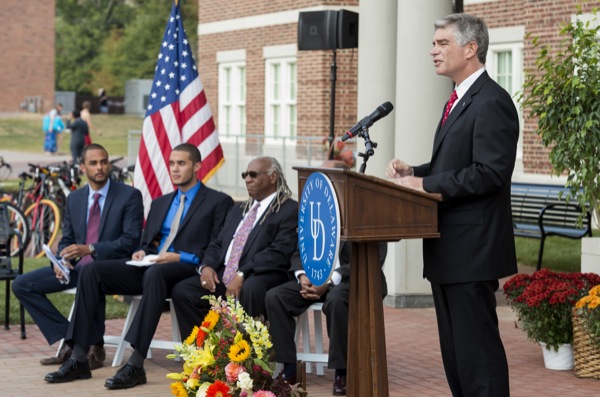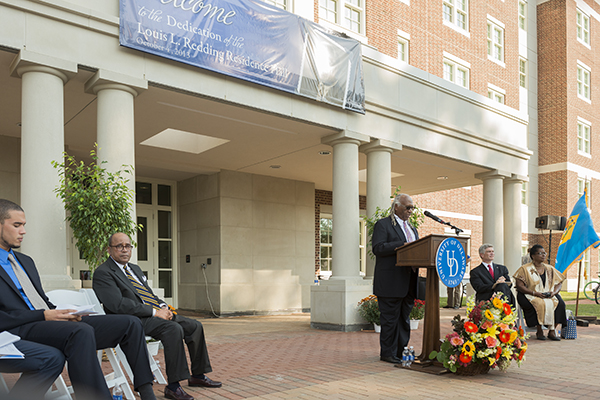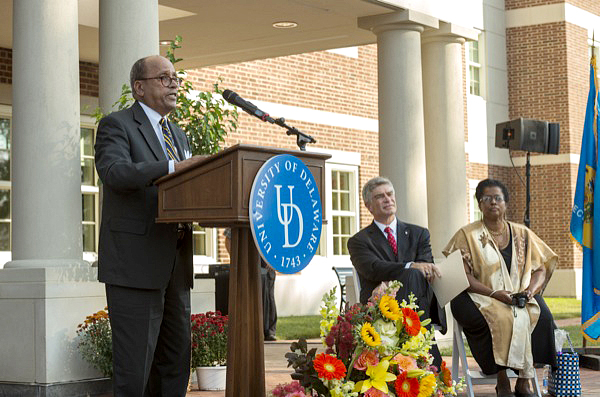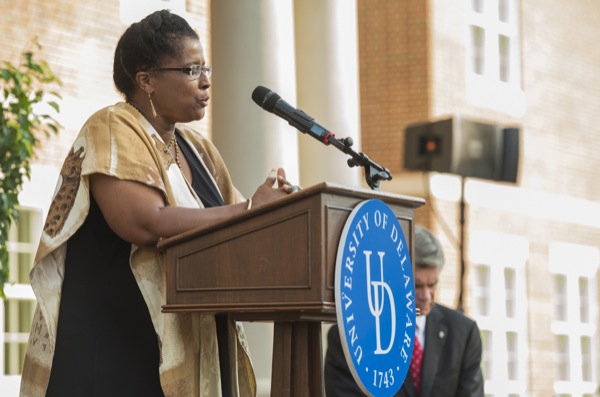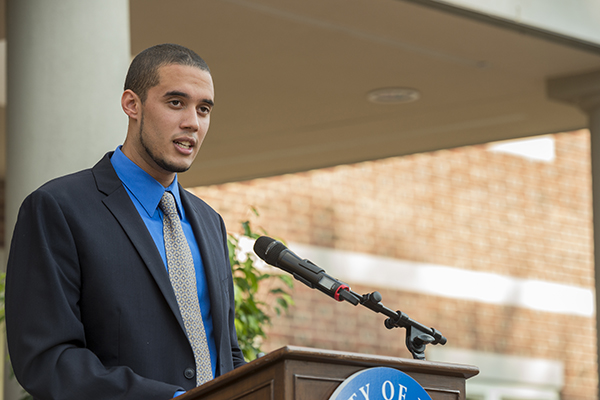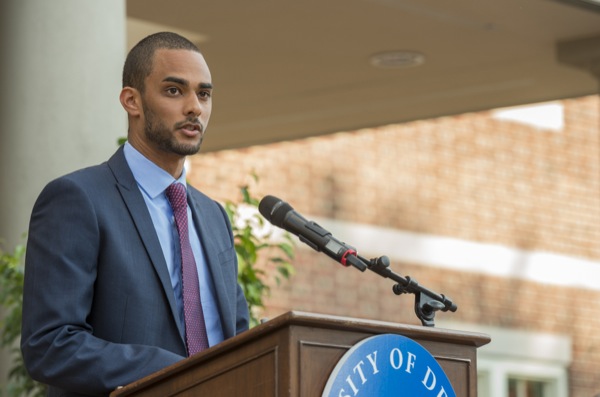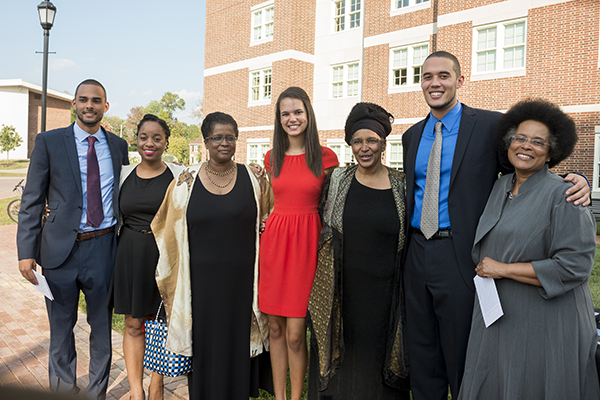

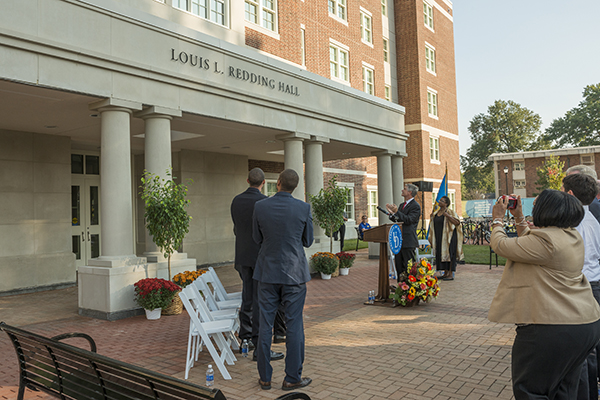
Redding Hall
Building dedication honors civil rights pioneer Louis L. Redding
4:10 p.m., Oct. 7, 2013--By winning a 1950 decision in Delaware Chancery Court, Wilmington attorney Louis Lorenzo Redding opened up the University of Delaware to African American students.
On Friday, Oct. 4, members of the Redding family and friends joined with members of the University community to honor the pioneering civil rights lawyer by officially dedicating the Louis L. Redding Residence Hall on UD’s East Campus.
Campus Stories
From graduates, faculty
Doctoral hooding
UD President Patrick Harker welcomed the guests at the ceremony, which also marked the opening of the adjacent Eliphalet Gilbert Hall, named after the University’s first president.
“This is an incredibly special day for us — a day of remembrance and celebration and, frankly, a day long overdue,” Harker said. “We’ve gathered to honor Louis Lorenzo Redding, one of a core group of lawyers who exposed the fundamental fallacy and grave offense of the separate but equal doctrine and effectively dismantled the structure of Jim Crow segregation, a man who established himself as a true legend of civil rights law in America.”
Harker noted that by honoring Redding and those who pursue justice, demand equality and work tirelessly to protect the civil rights and human dignity of all, UD rededicates itself to its core principles of diversity, equity and inclusion.
“Louis Redding changed UD for good,” Harker said. “We are the institution we are today because of him.”
Among the family members attending the dedication were Redding’s three daughters, the Rev. Ann Holmes Redding, president and founder of Abrahamic Reunion West, a nonprofit dedicated to peacemaking; Rupa Redding-Lallinger, professor of pediatrics and internal medicine at the University of North Carolina-Chapel Hill; and the Rev. J.B. Redding, founder and CEO of Caring Hands, who gave the invocation.
“Lord God, we say thank you for his life and his excellence,” J.B. Redding said. “He endured the weary years and we thank you that you brought him along.”
Leland Ware, the Louis L. Redding Chair for the Study of Law and Public Policy at UD, noted that the first recognition of the advocate of social justice began shortly after Redding’s death in 1998.
“A group of individuals in this community raised the money to fund an endowed chair, a group that included students of middle schools, prisoners in jail -- a wide range of people who rose up to complete the funding of this chair,” Ware said. “I’m very proud to be the first Louis Redding Professor. This building is a fitting memorial to him.”
An American hero, a Delaware treasure
James Jones, director of UD’s Center for the Study of Diversity and professor of psychology, lauded Redding as an American hero and a Delaware treasure.
“His legacy as a civil rights pioneer and a passionate and effective advocate and litigant of social justice is the life that brings us here today,” Jones said. “As Martin Luther King observed, ‘The arc of the moral universe is long, but it bends towards justice.’ Louis Redding helped bend that arc toward justice in American society and in the University of Delaware.”
Jones noted the Redding’s commitment to justice saw him through his undergraduate years at Brown University, where he graduated with honors in 1923, and through graduate education, where he was the only African American in his 1928 graduating class at Harvard Law School. He also cited Redding’s endurance as the only African American lawyer in Delaware for 26 years.
“The actual story of these times is complicated and reveal Redding’s tenacity and intelligence, discipline and dedication to justice,” Jones said. “Louis Redding was diminutive in stature but indomitable in spirit. His legal accomplishments were born of his love for the law, his fierce pride and his unswerving dedication to social justice.”
Jones also noted that Redding’s successful efforts in fighting segregation in Delaware led to his involvement in an even larger mission, which ultimately bore fruit in the historic Brown v. Board of Education decision in 1954.
“The U.S. Supreme Court ruled that whatever may have been the reasoning in 1896, the modern authority convincingly shows that racial segregation is inherently unequal, a fact that Louis Redding already knew too well,” Jones said. “This decision shaped the landscape of race relations in America and ushered in a movement to give African Americans the rights for citizenship and social justice so long denied.”
Redding’s legacy, Jones said, is reflected in the growth from single digit numbers of African Americans on campus in the early 1950s to the 2,459 students of color attending UD in the fall of 2013.
“We are not where we want or need to be with diversity on this campus, but we’ve come a very long way,” Jones said. “We are inspired by Mr. Redding’s courage, his dedication, vision and humanity.”
Legacy for a new generation
A continuation of Louis Redding’s efforts on behalf of social justice also was evidence in remarks by his grandsons, Lucas and Stefan Lallinger.
A student at Yale Law School and staff member of the Yale Journal of International Law, Lucas Lallinger reflected on what his grandfather’s legacy means to members of a newer generation.
“My grandfather has always been my hero and inspiration,” Lucas Lallinger said. “What stuck with me about him in the stories that my families have told was his stubborn persistence in the face of incredible obstacles.”
As a summer intern in the office of then-U.S. Sen. Joseph R. Biden Jr., Lucas Lallinger said he had the opportunity to learn more about the profound influence his grandfather had on those who knew and worked with him, including Vice President Biden.
“In 2006, I had the pleasure of being an intern for then-Sen. Joseph R. Biden,” he said. “I decided to be bold and introduce myself. To my surprise at the time, the vice president chatted me up and told me details about grandpa’s tastes in clothing, his speech patterns and many other things. For those of us in my generation who didn’t get to spend much time with our grandfather, these anecdotes and memories and indescribably special.”
Stefan Lallinger, principal of the Langston Hughes Academy Middle School in New Orleans, noted that, like himself, his grandfather was an educator and an administrator before beginning his famed legal career.
“My grandfather opened the door for us, but we have not yet walked through it,” Stefan Lallinger said. “To truly honor that legacy, we cannot just reflect on what he accomplished. We must reflect on how we can bring to bear his vision of equality of opportunity for all Americans.”
After the ceremony, a reception was held inside the newly dedicated Louis L. Redding Residence Hall.
Article by Jerry Rhodes
Photographs by Kathy F. Atkinson




